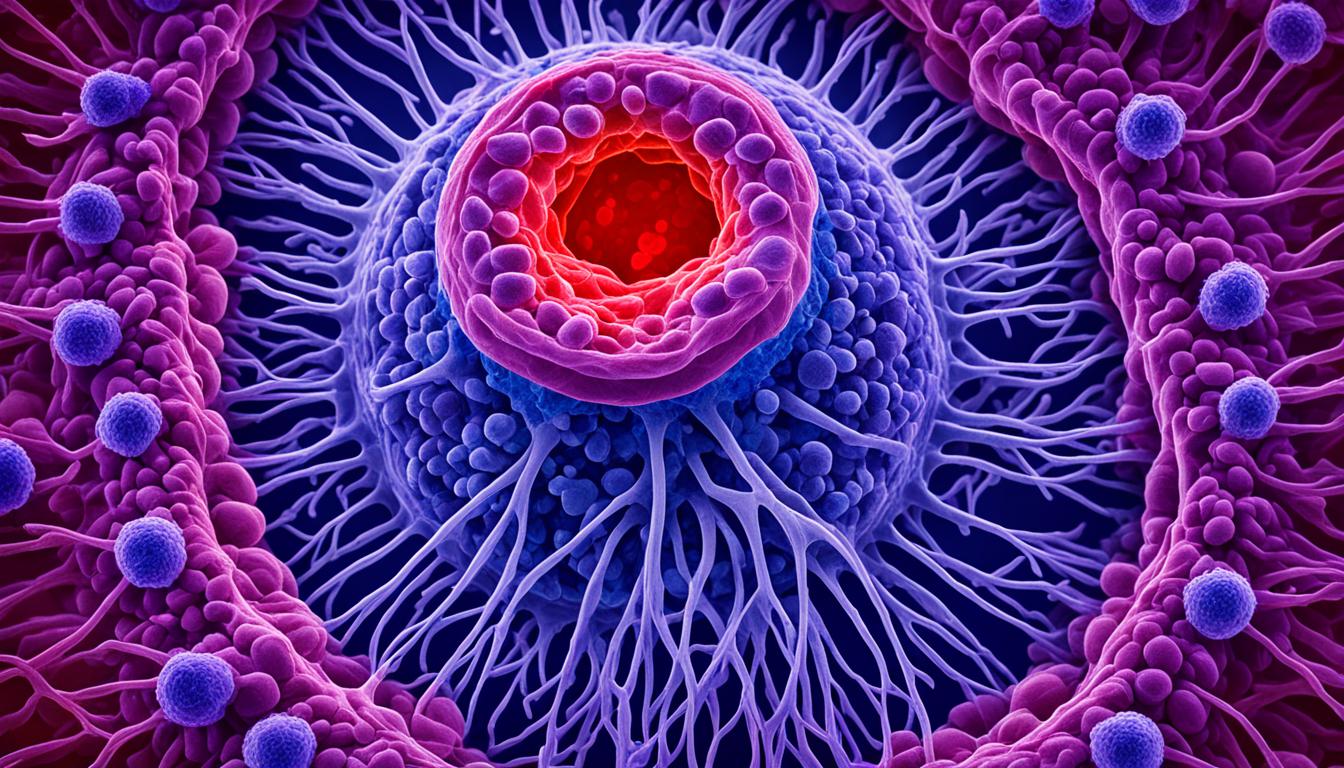Thyroid cancer impacts the thyroid gland, found in the neck like a butterfly. It’s marked by cell growth leading to tumors. Tumor types include papillary, follicular, medullary, and anaplastic carcinomas. Thyroid nodules, or gland lumps, often signal thyroid cancer.
The specific causes of this cancer remain unknown. But, radiation exposure and a family history of thyroid issues might elevate risks. Diagnosis involves several tests, like physical exams, biopsies, and imaging. Treatment comprises surgery, radiation, medications, and promising stem cell therapies. Stem cell treatment uses the patient’s cells to heal damaged thyroid tissue.
Key Takeaways:
- Thyroid cancer arises from abnormal cell growth in the thyroid gland.
- The main types are papillary, follicular, medullary, and anaplastic carcinomas.
- Nodules can indicate the presence of cancer.
- Factors like radiation exposure and family history can increase the risk.
- Diagnosis includes physical exams, imaging, and blood tests.
- Treatments range from surgery to stem cell therapy.
- Stem cell therapy is promising for repairing thyroid tissue.
Thyroid Cancer Surgery: Treatment Options and Side Effects
Surgery is a key way to treat thyroid cancer. The choice of surgery depends on the cancer’s type and stage. Two main surgeries are lobectomy and thyroidectomy.
Lobectomy removes the cancerous lobe of the thyroid. Thyroidectomy takes out the whole gland. If the cancer spreads to neck lymph nodes, lymph node removal may be needed too.
Thyroid cancer surgery works well but comes with side effects. Some side effects are:
- Voice Hoarseness: Your voice might change because surgery can hurt the nerves controlling vocal cords.
- Low Blood Calcium Levels: Surgery might affect the parathyroid glands, lowering calcium levels.
- Bleeding: There might be heavy bleeding during or after surgery, needing more medical help.
- Infections: Wound infections can happen, but they’re usually fixed with antibiotics.
- Thyroid Hormone Pills: After surgery, you might need thyroid hormone pills every day.
Not everyone will get these side effects, and they might not be severe. The surgery’s benefits are usually greater than its risks. It’s vital for removing cancer and stopping its spread.
Thyroid cancer surgery is a good treatment choice. But, it’s critical to talk about risks and side effects with your healthcare team. They can help you decide on the best treatment and care after the surgery.
Radiation Therapy and Medication-Based Therapies for Thyroid Cancer
Radiation therapy is common for thyroid cancer. It’s often used with surgery to get rid of any leftover cancer. It uses high-energy X-rays or radioactive iodine. These target and try to stop the growth of cancer cells.
In external radiation, X-rays focus on the tumor from outside. This keeps healthy tissues safe. Internal radiation, or brachytherapy, puts a radioactive device by the tumor. This way, the treatment is more focused.
Radiation can kill cancer cells well but might cause tiredness and low energy. Skin in the treated area might become red or sensitive. Throat issues, like a sore throat, can happen because the thyroid is close by. These problems usually go away with time.
Another choice is medicine. This includes thyroid hormone therapy, chemotherapy, and targeted therapy.
Thyroid Hormone Therapy
Thyroid hormone therapy uses synthetic hormones. It helps control the body’s hormone levels and slows cancer cell growth. It’s given to prevent the cancer from coming back.
Chemotherapy
Chemotherapy is used for cancer that has spread. It’s drugs that kill fast-growing cells. It works but can cause hair loss, diarrhea, and tiredness.
Targeted Therapy
Targeted therapy targets certain parts of cancer cells to stop their growth. It’s given as pills. This way of treatment has potential, but it can cause problems like fatigue, heart, and liver issues.
Both radiation and medicines are key in treating thyroid cancer. Doctors pick the best one based on cancer’s stage, spread, and the patient’s details. It’s important to talk to your doctor about what each treatment can do.
Conclusion
Thyroid cancer treatment needs many experts. Surgeons, medical oncologists, and others work together. They must make a correct diagnosis to choose the best treatment. The tumor size, spread, and cancer type affect the treatment.
Stem cell therapy is a new option. It uses the patient’s own stem cells to fix the thyroid. This method shows a lot of promise in making cancer treatment better. Clinical trials can offer new treatments.
Thanks to better tech and know-how, more people survive thyroid cancer. It’s key to talk to a team that knows a lot about thyroid cancer. They will create a plan that fits the patient’s needs, considering all choices and outcomes.

